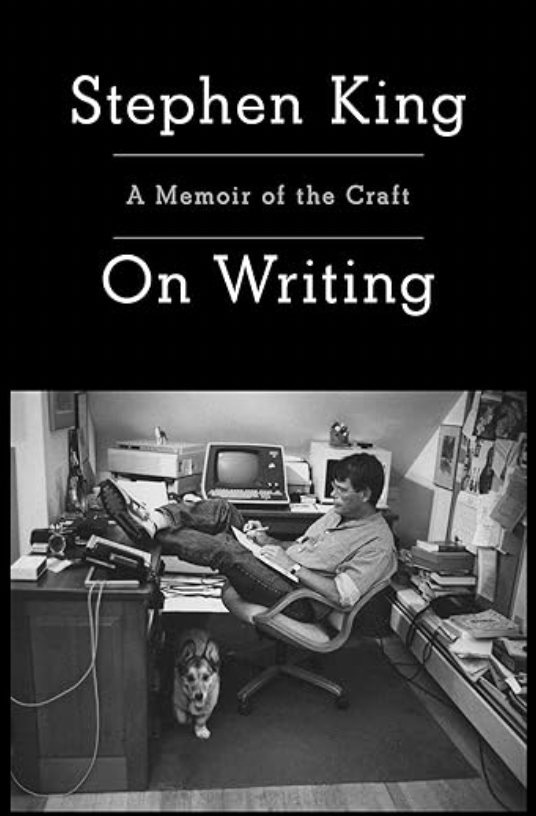Stephen King, known for his creepy thriller novels, is one of the most prolific best-seller generators alive. Yet, I’d never once wanted to pick-up one of his books. I am a giant scaredy-cat when it comes to horror movies and figured I wouldn’t last three pages in one of his novels. But, after reading Stephen King’s On Writing: A Memoir of the Craft for a writing book club, I can’t wait to pick-up my first Stephen King novel. Part memoir, part writing guide, this book is a treasure trove of fascinating information for aspiring writers and fans of King’s work alike. It is non-fiction, yet it’s a page-turner. If you’re familiar with his work, you’ll love hearing the origin stories of your favorite books and if you’re not, you’ll be immediately introduced to why Stephen King’s novels are best-sellers. He’s a damn good writer and he’s got some damn good advice for his fellow writers.
What Influences a Great Writer?
In On Writing, King takes readers on a journey through his early life, from his humble beginnings in rural Maine (and Wisconsin!) to meeting his wife, Tabitha, and getting his first few paychecks in the writing business. He didn’t have an easy life and it occurred to me that may have been an important part of his success as a writer. Shit gets real in his life just as it does in his stories. Always candid, always painting an incredible picture of each event, King draws readers in from the first page. I will probably never forget his graphic description of a poison ivy event with his brother, for example. Sheesh, thanks for those images, Stephen. His life stories gave me a clear understanding of where he came from and why he ultimately ended up writing.
Writing Advice from Stephen King
My favorite part of On Writing is King’s no-nonsense advice about the writing craft. The book is filled with practical tips that are simple, elegant, and invites every writer to hone their skills. If you want to be a good writer, he says, you need to read a lot and write a lot. He reads and listens to approximately 80 books a year from all kinds of genres. He goes everywhere with a book, even baseball games. Each day, he tries to write 10 pages or 2000 words per day and doesn’t stop until he gets there. His advice for new writers is to start with a goal of 1000 words per day and work your way up.
Your ToolBox
King likens writing skills to having a toolbox. On the top shelf of your toolbox is vocabulary and grammar. Don’t worry if your vocabulary isn’t large, he says, there are many successful writers (like Hemingway) who used very simple vocabularies. Just, for the love of god, don’t use adverbs (Stephen King hates adverbs)! He points out that narration, dialogue, and description make up the story, but don’t let the plot drive the story too hard. King is a discovery writer. He starts his stories with a situation (basically just an idea – what if you woke up 100 years later on a planet far, far away, for example) and then he lets his characters develop and lead him through the plot. I can’t tell you what a relief it is to hear this. I don’t write a lot of fiction, but when I start stories, I don’t know the endings either. My kids and I always tell made-up stories to each other on our hikes and never once did I know where that story was going before I got halfway through. I didn’t know I secretly needed permission to write that way, but I guess I did.
Theme & Symbolism
I had another “ah ha!” moment while reading this book…and it was a big one. You don’t have to start your stories with themes or symbolism in mind. King writes his first draft (quickly, in three months or less), and then he puts it aside for at least six weeks. When he returns, he reads through his work in one sitting (if possible) and starts to see the themes and symbolism that naturally developed. He uses his second draft to play those up.
Tell the Truth
Why bother writing if you aren’t telling the truth? For instance, use the language your characters would use, even if you think it will offend someone. Follow the plot where your characters take it, otherwise it will seem contrived. He mentioned numerous rejections and critical letters he’s received over the years, reminding us all that even the best writers have critics. Our one-star reviews don’t matter. What matters is that we’re telling the truth to our audience.
Stephen King’s Own Character Arc
No review of On Writing would be complete without mentioning King’s infamous accident in 1999, when he was struck by a van while out for a walk. His description of the accident — what he remembers, felt, thought — still haunts me. I can’t not think about it. The accident happened right in the middle of writing this memoir. His harrowing account of the recovery and his return to writing seems to serve as both a testament to his resilience and a source of inspiration for writers facing their own challenges. Clearly he’s had a long, fulfilling life since, but at the end of his memoir it was clear that the fragility of life was front and center in his mind.
In my opinion, On Writing is a must-read for all writers. It’s also a great read for almost anyone else. Whether you’re an aspiring author seeking guidance or a fan eager to peek behind the curtain of one of literature’s most celebrated careers, Stephen King’s memoir offers something for everyone. The book is surprising, practical, and so, so good.
Go order your copy now. Right now. You can write me a thank you note (without adverbs) later.
